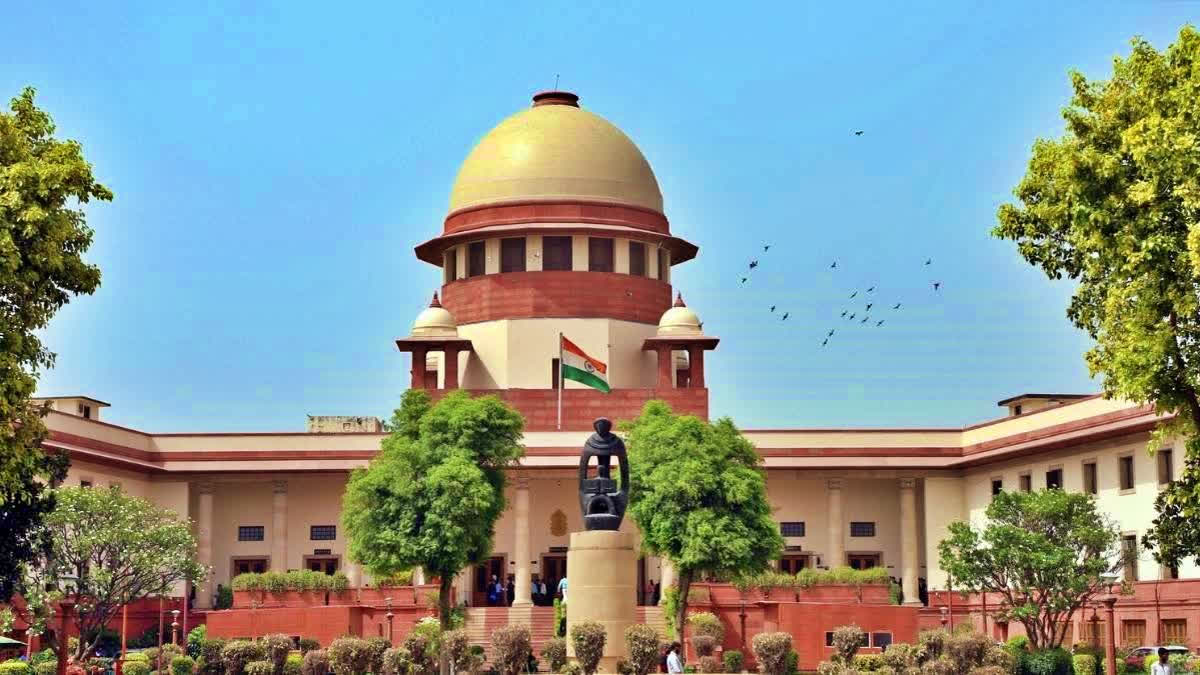New Delhi: The Supreme Court Tuesday said that Article 5 of the Jammu and Kashmir constitution shows that the Indian Constitution would apply to J&K and queried a counsel, the net consequence would be that the Constitution of India in its application to J&K would stand frozen as of 1957 and no further development in Indian constitutional law can apply to J&K, how can that be accepted?
A constitution bench headed by Chief Justice of India D Y Chandrachud and comprising justices S K Kaul, Sanjiv Khanna, B R Gavai, and Surya Kant, is hearing a batch of pleas challenging the abrogation of Article 370, which bestowed special status on the erstwhile state of Jammu and Kashmir.
Senior advocate Dinesh Dwivedi, representing petitioner Prem Shankar Jha, opened the arguments today before the five-judge bench. Dwivedi said sovereignty comprises two parts -- merely because you have ceded external sovereignty, it doesn't amount to ceding of internal sovereignty. He said Article 370 ceases to operate once the constitution of J&K was enacted in 1957.
Dwivedi said Kashmir was different both in terms of accession to the dominion of India where it ceded at a different time as an independent state or a nation and it was different in the sense that it didn't merge with India, unlike the other states. The Chief Justice queried Dwivedi that which is the provision in the J&K constitution which is equivalent to Article 245 of the Indian Constitution. Dwivedi contended that Articles 3, 4 and 5 of the J&K Constitution.
Justice Chandrachud said that Article 5 of the J&K constitution says the executive and legislative power of the State extends to all matters except those with respect to which Parliament has the power to make laws for the State under the provisions of the Constitution of India. He said it postulates that the Indian Constitution does apply to J&K.
The Chief Justice told Dwivedi that unless we accept that “Article 370 continued till 2019, there would be no trammel on the jurisdiction of Parliament (as per Article 5)…”.
Citing Article 5 of J&K, the Chief Justice said that for Article 370, Parliament would have the power to make laws with respect to all aspects in List 1 List 3, “If Article 370 goes, where is the limit of power of Parliament?” The top court orally observed that there are no provisions in the Indian Constitution, that bars its applicability to Jammu and Kashmir.
Posing a query to Dwivedi in the context of his arguments, the Chief Justice said the net consequence would be that the Constitution of India in its application to J&K would stand frozen as of 1957. He said, “Therefore, no further development in Indian constitutional law can at all apply to J&K according to you after 1957. How can that be accepted?”
The top court said if Article 370 ceases to operate and Article 1 continues to operate then J&K is an integral part of India and surely, “the jurisdiction of every democratically elected institution in India is not excluded in its application......it has to be dealt with a provision of Indian Constitution”. The top court specifically asked Dwivedi, that there has to be a provision in Indian Constitution which excludes its applicability to J&K.
Dwivedi said that our thinking, which we have been tuned to think for the last 70 years, is that one nation, one Constitution, but where is that prescribed? Dwivedi said when they gave this power of consultation and concurrence, it was in a peculiar situation and the basic theme is that Kashmir was different in terms of accession to the dominion of India and it didn't merge, unlike the other states.
Kaul said he finds it difficult to accept that the constituent assembly debates amounted to an assurance that Article 370 would dissolve itself. Dwivedi said the debates would have to be looked at in connection with the intention behind Article 370 and its scope.
Justice Kaul said he thought that Dwivedi said that 370 didn't exist and it should be read in a manner that 370 was intended to dissolve itself after the completion of the constituent assembly. Justice Kaul said to look at the consequences of what would happen if the court were to accept Dwivedi’s argument.
Dwivedi said he does not feel there would be any adverse consequences and that was the intent of the framers, and they felt that Kashmiris may feel differently but they never imposed that, still they are allowed to make a constitution and constitutions aren't made for a day.
Justice Kaul queried Dwivedi that he is saying that all that happened for the last few decades is wrong, and no one understood the Constitution. Dwivedi replied that the Supreme Court had done a similar exercise in Indra Sawhney vs. Union of India. Dwivedi concluded his arguments today.



